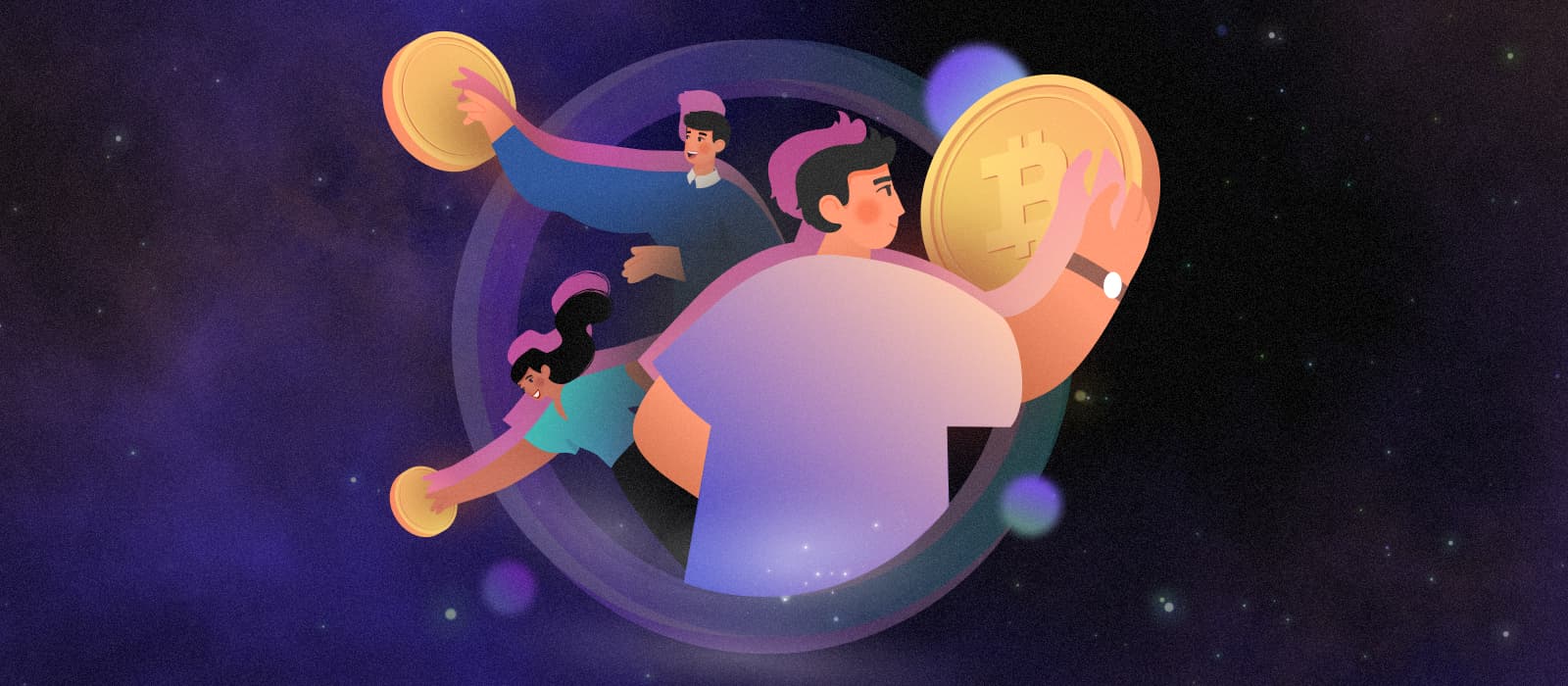Soulbound tokens: coming soon, in the Web3 space! But don’t worry, you won’t be expected to sell your soul to the global network. Instead, you’ll be able to take control of your identity and accomplishments.
The first person to start talking about soulbound tokens (SBTs) was Vitalik Buterin, Ethereum’s co-founder. He was wondering what it would be like if we took the idea of soulbound items from the massive video game World of Warcraft and applied it to real life, though in the digital domain.
Vitalik Buterin also explained that there is “a lot of underexplored opportunity in trying to go beyond financialization. Making more items in the crypto space “soulbound” can be one path toward an alternative, where NFTs can represent much more of who you are and not just what you can afford.”
It’s true that NFTs are mostly seen as a way to make money, and some people did make a fortune when NFTs were at their peak of popularity. However, these days, experts are starting to look at NFTs and other tokens from a different angle: they’re curious about how this technology can be developed further and serve a wider purpose.
A soulbound token is one of the directions in which this technology may evolve. Let’s find out what soulbound tokens are, what benefits and drawbacks they have, and what they will do in Web3.
What are soulbound tokens?
A soulbound token is a non-transferable and publicly-verifiable digital identity token that represents an entity, its credentials, reputation, or achievements in a decentralized society.
The idea of soulbound tokens and a decentralized society (DeSoc) governed by its users was described fully in a whitepaper by Vitalik Buterin, Glen Weyl, and Puja Ohlhaver published in May, 2022. They discussed how SBTs could be created and how they could potentially function like the credentials we are used to but in a decentralized digital world.
Before getting into how SBTs work, we should first find out how and by whom they can be created. The term associated with the process of issuing and storing personal records is called a Soul. This can be a company, an institution, or an entity. For example, you graduate from a university and receive your degree certificate. Your university, which will issue a digital certificate and a token, will be the Soul in this case.
On the other hand, wallets are also called Souls. People can have numerous wallets, or Souls, that will safely store records from different areas of their lives such as education, medical history, work experience, and so on.
It’s important to note that soulbound tokens, just like NFTs, cannot be issued without a blockchain. They will forever remain there and will be tied to a specific user for life.
Users will not be able to sell their soulbound tokens or transfer them to another person. Thus, SBTs will not bring users any financial gain, but instead will help people protect their identities and give them maximum control over their personal data. In fact, the soulbound token holder will be able to control who is granted access to the data behind the token and can decide to revoke this access.
All in all, the adoption of SBTs is a logical step towards decentralization. And this is exactly what blockchain development and Web3 are striving to do.
What Is Federated Learning: Key Benefits, Applications, and Working Principles Explained
Top 10 Real-Life Applications of Large Language Models
Check out WatchDog, a solution that helps protect intellectual property in Web3
How will soulbound tokens be used in the Web3 space?
![]()
Soulbound tokens can be applied to any use case of web3 space, where we need to store or share personal information or records of our accomplishments. So, people will use SBTs to prove their professional skills, verify their credit history, manage medical records, verify attendance at various events, and prove their reputation. Let’s consider each of these use cases in detail.
Proof of professional skills
Soulbound tokens can represent a person’s credentials related to their educational and work background in Web3. These can be diplomas, professional certificates, work history, and resumes. All this data will allow a potential employer to see that all documents are verified and the applicant’s skills are therefore proved.
Credit reports
If a user needs to take out a loan, they can provide lenders with access to their credit profile that will be represented by SBTs. In this way, lenders will be able to quickly check the user’s credit history and approve the loan (or not, depending on how diligent the user has been in their previous payments).
Medical record management
When people seek medical help, the extra headache of finding a doctor, explaining their medical history, and dealing with an insurance company is not exactly what they need at that moment. If doctors and patients start using SBTs to store medical records, most of these problems can be avoided.
It will be patients who have full control and access to their medical records, and they will be able to quickly verify their identity and share their medical history with doctors. This is especially important when the patient switches doctors and hospitals and seeks insurance. With SBTs, they won’t need to make hard copies of their papers. Instead, they will share (as well as revoke) access to their data with a few clicks.
Digital ID and memberships
Our IDs and membership cards can also be presented in the form of soulbound tokens. Gyms, sports clubs, libraries, and any kind of institution can issue SBTs to their members and enable them to store tokens in their wallets. In this way, people will have access to their data and visits and can keep these tokens for life.
Users will also find it convenient to keep all their IDs inside one digital wallet instead of always having to carry a physical wallet full of cards.
Attendance verification
This use case is very similar to what a Proof of Attendance Protocol (POAP) offers these days. The difference is that the SBTs’ main purpose is to verify that the user actually attended an event and a POAP is an NFT that organizations use as part of their loyalty programs and marketing campaigns.
Reputation indicator
Soulbound tokens can also become an indicator of reputation on the Web3 network. People with a good reputation can help build DAO development solutions that will be even more active in Web3. For example, people holding respectable SBTs can get majority votes to stand guard over the DAO’s integrity and protect the organization from bad actors.
How to Ensure Infrastructure Security: Best Practices for Your Business
12 Most Prominent Use Cases of Construction Data Analytics
Learn more about DAOs from the Mantra DAO platform that PixelPlex built for their client
What are the benefits of using soulbound tokens?
![]()
Soulbound tokens offer several major benefits: they greatly reduce reliance on centralized organizations, guarantee the authenticity of documents, increase trust in the Web3 space, and cannot be sold or transferred. Here are more details about how SBTs can do all that.
- Reduce dependence on centralized services
Currently, most of the services are centralized, which means that companies can access and collect our personal information for marketing and other purposes. With soulbound tokens, people have sovereignty over their data. It will be users themselves who manage their personal info and decide who can access it and for what reasons.
- Non-tradable and non-transferable
Compared to NFTs, which are easy to buy, collect, or hoard, SBTs don’t offer that. Why is this a benefit? Because soulbound tokens will require effort to get, and they will serve a more important purpose than just making money, such as building a person’s reputation and allowing them to take out loans and access specific projects.
- Guarantee document authenticity
Digital verification and documentation will be typical features of soulbound tokens, to the benefit of both individuals and institutions. Your documents will be easy to store and take with you anywhere, and it will be faster for agencies to verify their authenticity.
- Enhance trust among members of the decentralized society
SBTs will provide DeSoc members with the means to check people’s reputations, so they will trust each other more than they would through casual interactions on social media or through digital projects.
Interested in learning more about soulbound tokens? Immerse yourself in this innovative digital phenomenon by watching our latest video. Explore their transformative potential and gain a leading edge in understanding the future wave of blockchain innovation.
What are the limitations associated with soulbound tokens?
There are several concerns related to the possible implementation of soulbound tokens in the future, and the absence of 100% proven methods to recover lost Souls is one of them.
The whitepaper by Vitalik Buterin, Glen Weyl, and Puja Ohlhaver suggests a number of methods to recover Souls, but those methods still need to be tried out and approved. For example, a community recovery model would require a member from a qualified majority of a (random subset of) Soul’s communities to consent when recovering a Soul’s private keys.
Another method requires a person to choose a group of so-called guardians and give them the right to change their wallet keys by majority vote. What if a person loses contact with one of them or their relationship sours? This is life, anything can happen, so it will be difficult to entrust your Soul recovery to a group of people who may let you down, even if they did not do it intentionally.
One more concern is that a reputation-based community may turn into a social credit system where people with higher ratings will get more benefits and others may get banned. This raises ethical questions and doesn’t give people a chance to improve.
NFT Launchpad Development: a Comprehensive Guide Based on PixelPlex’s Expertise
What Is POAP and How to Use It Effectively?
Introduce yourself to CheckNFT.iO — a solution that analyzes NFT collectibles and detects fraudulent activities
Closing thoughts
Soulbound tokens are still only a nascent concept. But they could break into our digital world at any moment. In the same way, we talked about Web3 as the idea of the future and Web3 security, but this future has already come and is developing now.
It’s a fact that decentralization and related phenomena are here to stay, and it’s up to you if you’re among the first to jump on board and rule the Web3 space. If you need a great partner for your journey, you can always count on our professional web3 development services company and NFT development services.
With over 15 years of experience in blockchain development, PixelPlex knows this technology inside out. We will help you decide which blockchain to use for your project and how exactly to bring your ideas to life. Ultimately, we will create a solution that will astonish your users and bring you real benefits.




